I’ve played a lot of games in the 10 or so years that I’ve been in the hobby, and have a pretty good read on what I like and don’t like. Here are six games that I shouldn’t like, but I do.
One of the best things I’ve discovered about the modern board game hobby is its sheer variety. I believe that there is a game for everyone, no matter your preferred tastes, interests, or desired complexity. Over the years, I’ve found some elements that I just do not like…except for these six games. Here are my Top 6 Games I Shouldn’t Like
Power Grid – Math
I’ve never been a big math guy. Sure, I did okay in high school algebra and for some reason still remember the quadratic equation, but math—particularly mental math—has never been a strength. That proves to be a liability in a lot of modern hobby games where the difference between winning and losing may come down to my ability to determine which move gets me six points versus five.

Power Grid is a medium-heavy economic game about paying money for power plants via auction, paying money for resources from a changing market to power those plants, then spreading your way across the board building power plants like some kind of electric Johnny Appleseed. Oh, did I mention that you have to pay money to build too? Anticipating resource and expansion costs is crucial when deciding to bid on that shiny new uranium plant.
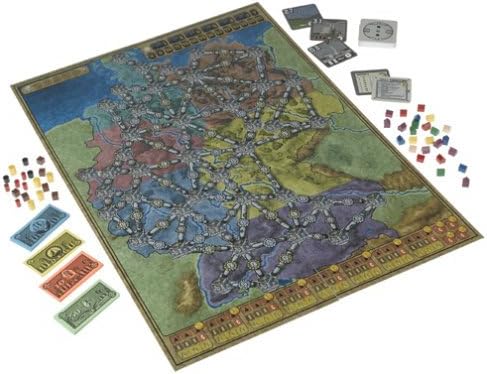
Like any financial budgeting, it’s a lot of math. Despite all that, I love, love, love, this game. Something about it just clicks, and I’m always up for a game. (Provided you let me keep a calculator handy when my math-averse brain gets tripped up trying to carry the one.)
Gloomhaven – Limited Communication
I’ve talked before about reasons why people game; the social element is by far my most important gaming motivation. So why would I want to gather all my friends together just for us to not be able to talk to each other? Games like The Mind, The Crew, and The Game impose arbitrary limitations on speaking, turning the game into a bespectacled librarian scolding us with “Shhhh. Quiet!” Even worse are games like Hanabi where you can communicate, but only in a very specific way. The nebulous communication rules dangle the intended message like a carrot just out of reach, while also expecting you to fill up on carrots.
So why does Gloomhaven break this rule for me? The rules for discussing planned actions and turn initiative are hazy, to say the least. “I can’t tell you what my initiative number is, but let’s just say I’m going medium fast.” “I can’t say what move I’m doing this turn, but maybe avoid the third hex from the right?”
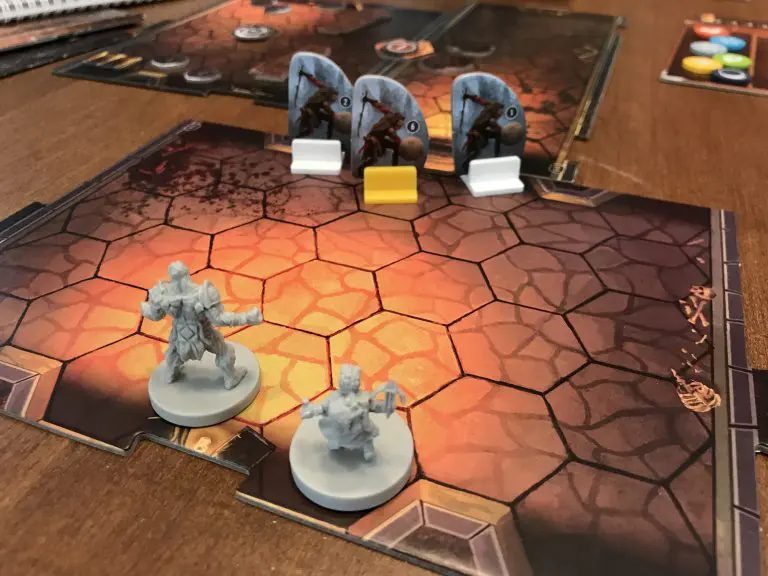
I could say that it’s because it makes sense thematically, simulating the chaos of combat. In the heat of battle, you don’t have time to huddle and draw up the play. Instead, you’re running around with your sword yelling “HEY! YOU STAY HERE. I’M GOING OVER THERE NOW!” If I’m honest, though, the real reason I don’t mind Gloomhaven limiting my communication is because I love the rest of the game so dang much. Between Gloomhaven, Jaws of the Lion, and Frosthaven I’ve put hundreds of hours into this world and I still want more.
Stockpile – Stock Trading
I once did a project in high school economics that simulated being a day trader in the American stock market. I was given a small amount of fake money and full freedom to buy and sell as I please. Suffice to say, you don’t want me anywhere near your stock portfolio. Stock-market themed games are often unwieldy, complex beasts that, coupled with my aforementioned distaste for mental math, just had zero appeal to me.
A friend convinced me to play Stockpile, and to my surprise, I loved it. The combination of hidden information and fixed auction prices makes it less of a mathematical, calculated economics game and more of a push-your-luck set collection game. It’s a stock market game for people who don’t like math.
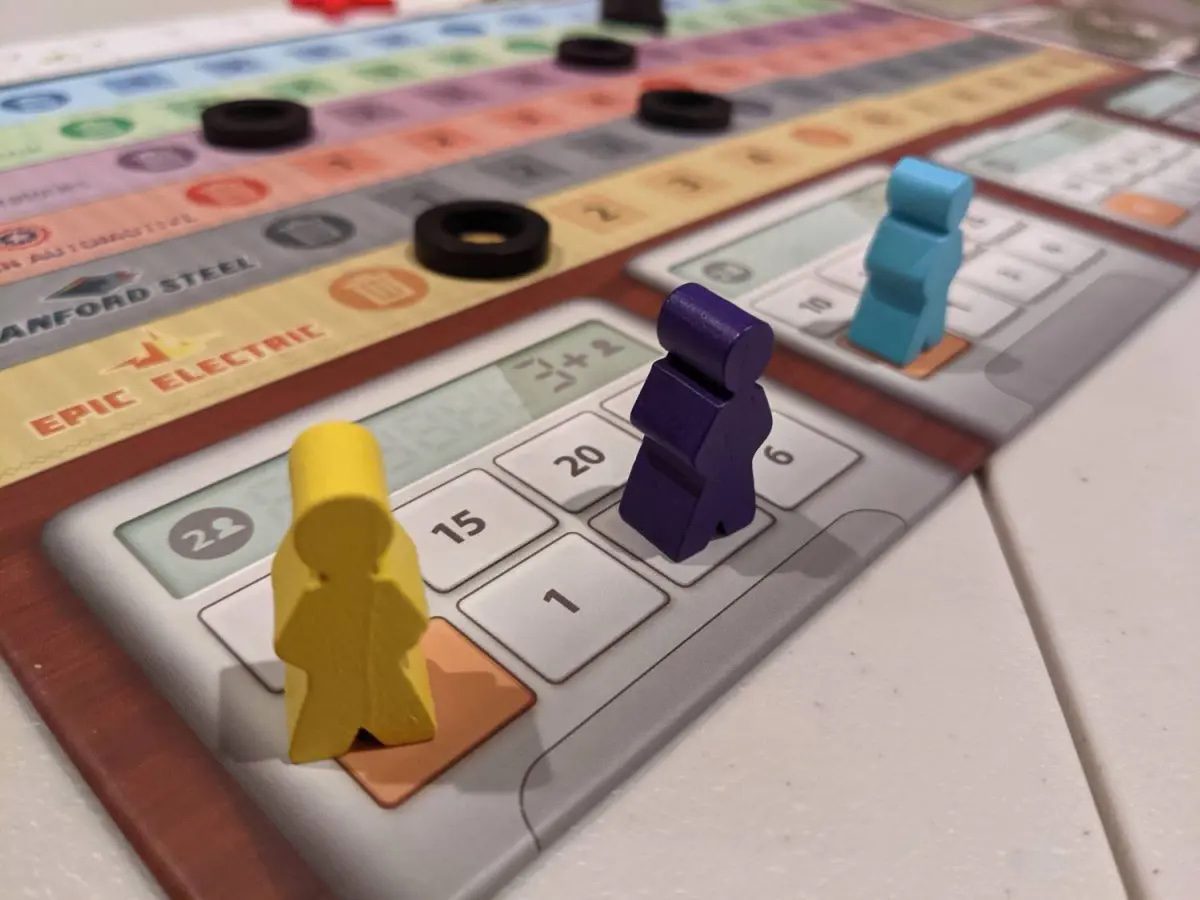
It doesn’t out-stay its welcome, simple enough to teach to new gamers, but clever enough to appeal to modern hobby sensibilities. Quite simply, investing in Stockpile is a winning move.
Santorini – Abstract Games
I once briefly got into chess in high school, diving down the rabbit-hole of openers, gambits, end-game strategies, famous games, etc. My main motivation was to beat my best friend at the time, a chess fanatic with a brilliant tactical mind. No matter how much I studied, researched, and practiced, I never beat him. Even after at least a hundred plays, the best I could do was one stalemate. When I got back into the board game hobby back in 2014, I soon discovered that abstract games just were not my jam. Whether it’s shape-related like Blokus, chess-adjacent games like Onitama or The Duke, any of the Project GIPF series, I could never wrap my brain around abstracts. Combine that with the lack of theme or inherent social interaction meant that while respecting the genre, abstract games just don’t fit for me.
Santorini, on the other hand, I love. Building beautiful, blue-domed marvels of architecture is both visually and tactilely pleasing.
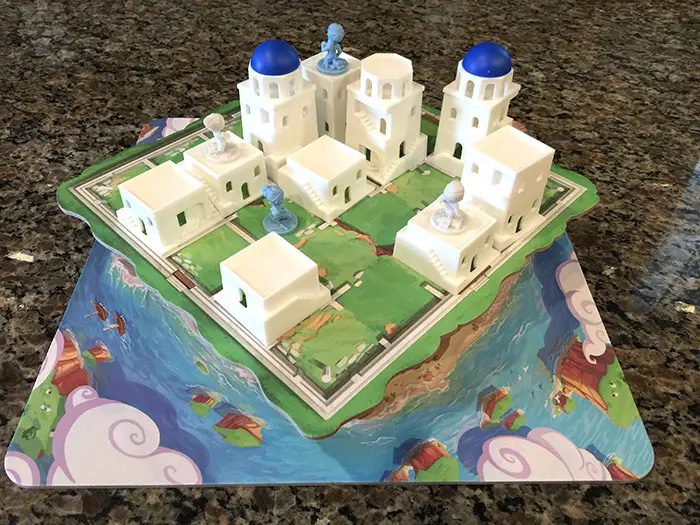
The simple goal of “be the first player to stand on the top floor of a building” is easy enough to understand. However, that alone is not why I like Santorini. Unlike most abstracts, it’s not completely themeless. The theme of Greek gods brings in the true special sauce of Santorini, the god cards. Each god gives an individualized special power, creating just the right amount of chaos that makes this game sing. There are enough gods included to make some wacky combinations, changing up the game each time.

Games are quick, usually less than 15 minutes each. It’s the kind of game that makes me want to keep coming back to it, just to see what kind of colorful chaos you get today from the god card combos.
New York:1901 – Polyomino Tile-Laying
One of the biggest buzzwords in the hobby right now is “polyomino.” For those not familiar with the term, think “domino,” but instead of 2-sided (duo) it’s multi-sided (poly). Or we could just call them Tetris-pieces, but it’s more fun to have complicated lingo. We’ve seen blockbuster hits like Patchwork, Planet Unknown, The Isle of Cats, and Barenpark all delight us with the relatively simple idea of laying down shapes in specific patterns to meet specific scoring conditions. Even more complex euro games like A Feast for Odin and Santa Maria include polyominos as a core mechanism. Maybe it’s my lack of visual-spatial aptitude, but for whatever reason, I’ve just never gotten into them. While others gleefully fit that L-shaped piece into the perfect spot, I’m sitting here struggling to mentally manipulate shapes, cursing my past self for blocking off that optimal placement two turns ago.
So why do I like New York: 1901? I can think of a few reasons. The theme of building turn-of-the-century skyscrapers is fun. Actions are quick and intuitive: take a blueprint card, reserve a lot, build a building. With the exception of the end-game bonus cards, there aren’t any additional scoring rules to placement: if you put the building down, you get the points.
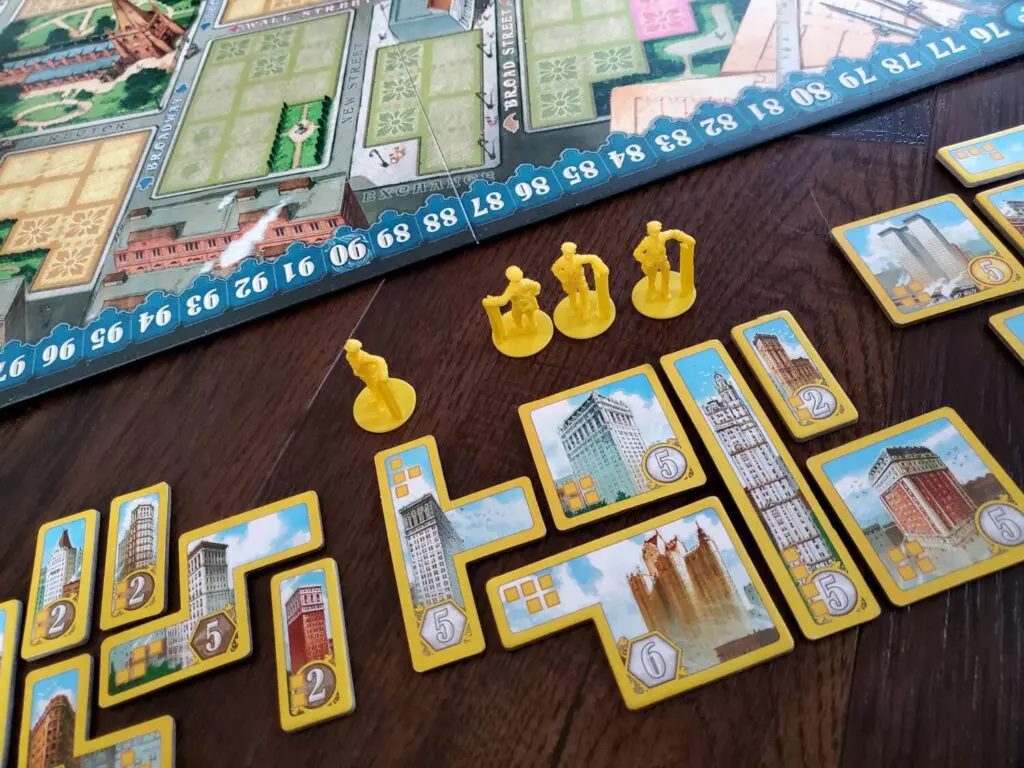
Additionally, you’re not so much fitting your pieces to specific spots. Instead, you’re reserving the spots to fit your buildings. This turns the polyomino formula on its head in a way that I can now understand it. Add in the player interaction that comes from a shared board and you’ve got yourself a really enjoyable family-weight game that is critically underrated, currently not even in the top 1000 games on BGG. New York: 1901 is a game that just keeps me coming back.
Dice City – Multiplayer Solitaire
I mentioned earlier that my biggest motivation for gaming is social interaction. To no surprise, I prefer games where players….interact. If I’m playing a game that only has personal player boards, more often than not, I won’t enjoy it. I don’t feel like I’m playing a game with my friends. I’m playing a game, while other people are also playing the game. Winning doesn’t mean beating my opponents. Winning means beating the game in a better way than my opponents did. I find that extremely dull and unrewarding.
Except for Dice City. In Dice City your turn consists of rolling your personal dice, then manipulating them across a series of rows and columns on your personal player board in order to produce resources to buy buildings. Slotting those buildings onto your board allows you to manipulate the dice rolls to activate the buildings on future turns, eventually converting them into points. Were it not for the changing shared market and some limited objective cards, what your opponents do on their turn has almost no effect on you.
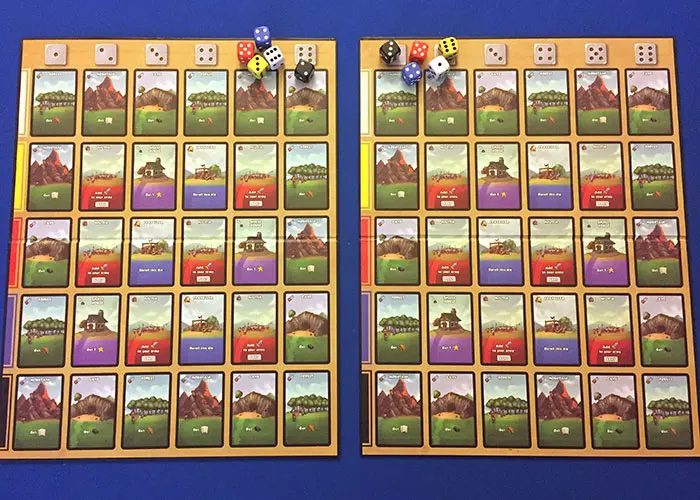
Sure, there are some military-themed cards that can be used to damage other players’ buildings, but it’s almost never an optimal play. There ends up being very little if any player interaction.
Honestly, the reason this game breaks my rule stumps me. Maybe it’s the thrill of rolling dice, building up your little hamlet, then maneuvering your next dice rolls to make them land on those shiny new buildings you just got. It takes the “roll dice and get stuff” mechanic you see in Catan, Machi Koro, and Space Base, amps that up exponentially yet never manages to feel bloated. Whatever it is that breaks my rule, I can’t say. All I can say is that it’s super fun.


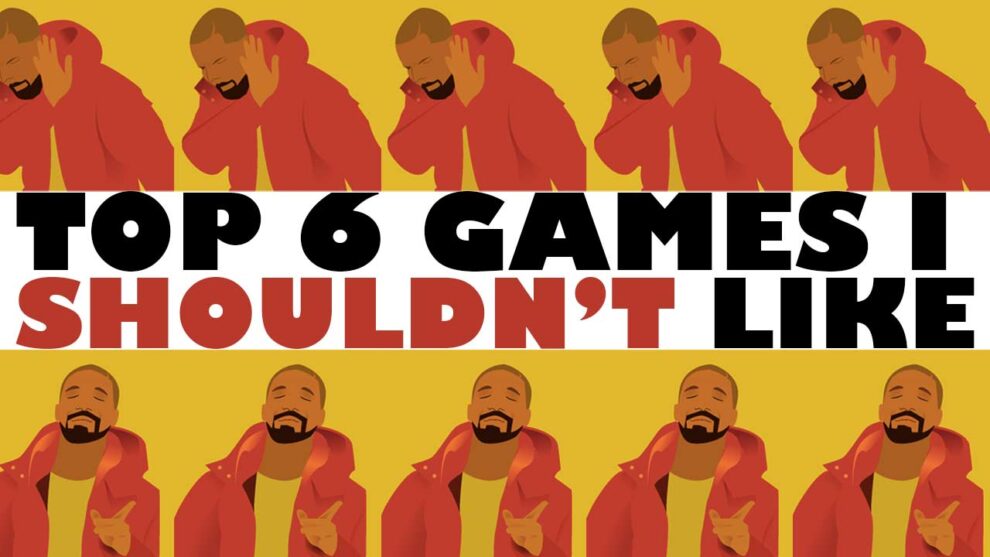





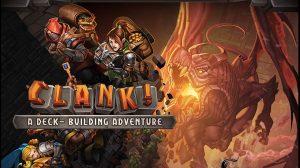
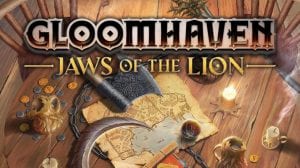

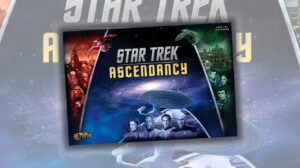




This is a great list! And a great idea for an article. Thanks for sharing.